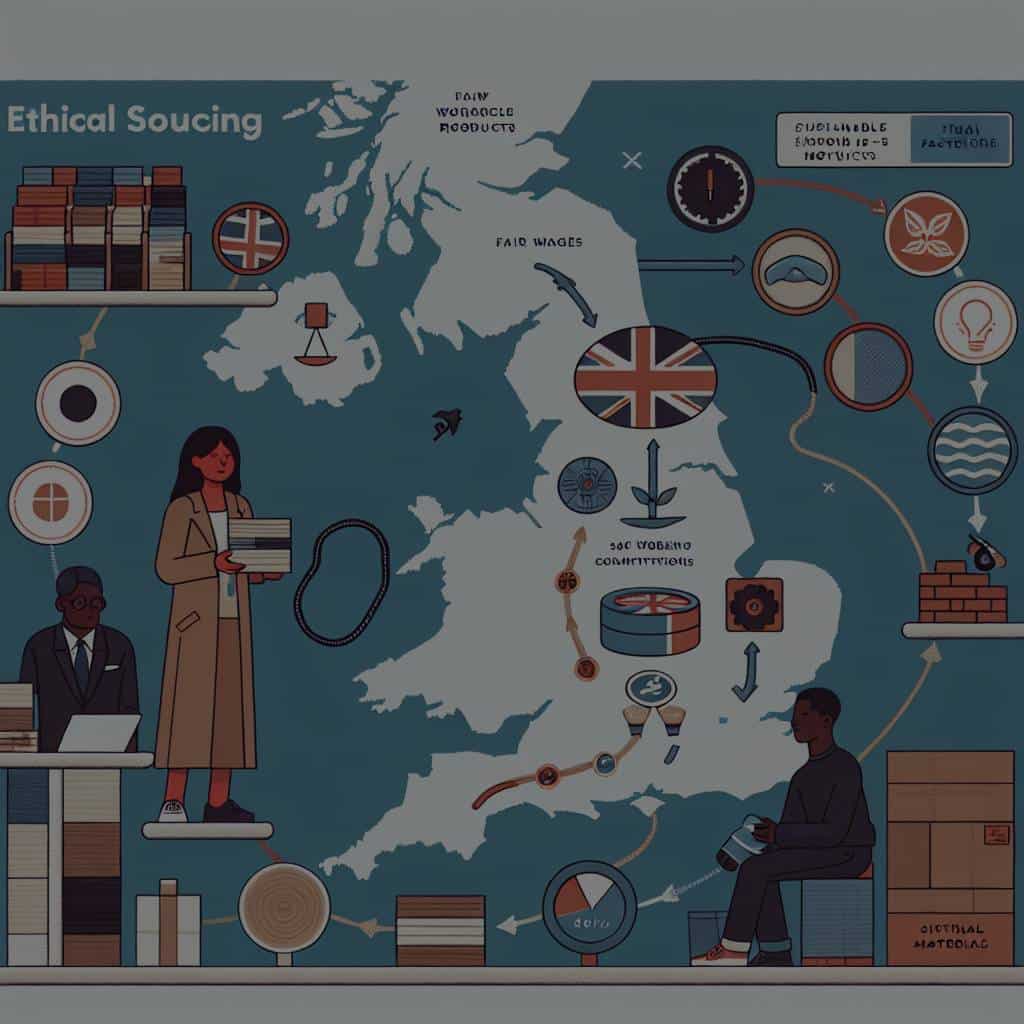How to Ensure Ethical Sourcing in the UK Fashion Industry’s Supply Chain?

In an era characterized by increased environmental consciousness and an urgent call for sustainability, the fashion industry is finding itself in the spotlight. As you navigate the complex world of apparel and retail, you’ll encounter a critical aspect that requires your attention: the supply chain. Specifically, how to ensure ethical sourcing, promote sustainability, and imbue transparency within your business operations. This article aims to provide you with practical guidance on building an ethical supply chain in the UK fashion industry, offering insight into the role of suppliers, data, transparency, and sustainable practices.
Understanding the Importance of Ethical Sourcing
Before delving into the practical details, it’s crucial to grasp why ethical sourcing matters in the first place. Ethical sourcing is the process of ensuring the products being sourced are obtained in a responsible and sustainable way, that the workers involved in making them are safe and treated fairly and that environmental and social impacts are taken into consideration during the sourcing process.
Also read : What Are the Best Practices for Energy Efficiency in UK Data Centers?
This concept goes beyond mere legal compliance, focusing on the welfare of all participants in the chain, from the cotton farmers to the factory workers. At its core, it operates on principles of fairness, respect, and decency, ensuring that companies carry out their business in a way that is beneficial to all.
In today’s competitive business landscape, ethical sourcing is not just a moral obligation, but also a strategic business move. Companies adhering to ethical sourcing practices are likely to enjoy enhanced brand reputation, customer loyalty, and improved supplier relationships. Moreover, it helps in addressing pressing global issues such as climate change, resource scarcity, and social inequality.
Topic to read : Optimise cross-channel logistics with an expert in calais
Identifying and Engaging Ethical Suppliers
Your supply chain is only as ethical as your suppliers. To build an ethical supply chain, you first need to identify and engage suppliers who share the same values as you. This involves conducting thorough due diligence, assessing their labor practices, environmental impact, and overall business operations.
With the rise of digital technology, there are now platforms that offer supplier data, enabling you to evaluate potential partners based on their ethical performance. This is a significant step towards transparency within your supply chain, providing you with the necessary information to make informed decisions.
However, identifying ethical suppliers is only half the battle. Engaging them meaningfully involves cultivating strong relationships, fostering open communication, and working together towards sustainable practices. It also includes holding them accountable and ensuring they adhere to the agreed-upon ethical standards.
Implementing Transparency in Your Supply Chain
Transparency is a key factor in achieving an ethical supply chain. This involves disclosing information about your sourcing practices, suppliers, and production processes to the public. Transparency enables consumers to make informed decisions, promotes accountability, and fosters trust between you, your customers, and your partners.
One way to foster transparency is through traceability, which entails tracking the journey of a product from its origin to the consumer. This would involve documenting every step in the production process and making this data accessible. Another way is through third-party certifications and audits, which provide an unbiased assessment of your supply chain practices.
Adopting Sustainable Practices
Sustainable practices are an integral part of an ethical supply chain. This means implementing initiatives that reduce environmental impact, promote resource conservation, and ensure long-term business viability.
In the fashion industry, this could involve using organic or recycled materials, reducing waste during production, and promoting recycling and reuse of products. Energy-efficient manufacturing processes and the use of renewable energy sources are also key aspects of sustainability.
Moreover, sustainability also encompasses social aspects. This includes ensuring fair wages, safe working conditions, and respecting workers’ rights. Companies can also contribute positively to the communities in which they operate, through initiatives such as local sourcing and supporting local businesses.
Leveraging Technology for Ethical Sourcing
In today’s digital age, technology plays a pivotal role in promoting ethical sourcing. Innovative solutions can aid in tracking and managing supplier information, providing real-time data on supply chain operations, and facilitating transparency and traceability.
Blockchain technology, for instance, can provide an immutable record of transactions, helping to trace a product’s journey from raw material to finished product. Similarly, Artificial Intelligence (AI) and Machine Learning (ML) can be used to analyze patterns and predict potential ethical issues in the supply chain.
Furthermore, digital platforms can enable seamless communication between companies and suppliers, fostering stronger relationships and facilitating collaboration towards ethical and sustainable practices.
In conclusion, ensuring ethical sourcing in the supply chain is not a simple task. It requires a comprehensive approach that involves engaging ethical suppliers, fostering transparency, adopting sustainable practices, and leveraging technology. However, it is a worthwhile endeavor, bearing significant benefits for your business, society, and the planet.
The Role of Brands and Retailers in Ensuring Ethical Sourcing
Brands and retailers have a significant part to play in ensuring ethical sourcing within the supply chain. As the final link in the chain that connects consumers to the products, they have the power to influence not only their own practices but also those of their suppliers. Their actions can shape the entire apparel industry towards more sustainable and ethical practices.
Brand and retailer commitment to ethical sourcing is critical. It involves developing, implementing, and monitoring comprehensive ethical sourcing policies. These policies should explicitly outline commitments to fair labour practices, human rights, environmental stewardship, and chain transparency. Moreover, they should extend beyond mere compliance with laws and regulations to encompass best practices in responsible business operations.
Fast fashion companies, in particular, need to slow down their production cycles and consider the long-term environmental and social impacts of their business models. Brands should also be willing to invest in their supply chains, whether it’s in the form of paying fair prices that allow for decent wages or investing in sustainable materials and technologies.
Brands and retailers should also make their supply chain information public, including the names and addresses of their supplier factories. This practice is a key component of chain transparency and helps to hold companies accountable for their supply chains. It also provides a valuable tool for activists, researchers, and consumers seeking to understand and influence the industry’s impacts.
The Intersection of Social Responsibility and Sustainability in Fashion
The pursuit of an ethical supply chain in the apparel industry is where social responsibility and sustainability intersect. It’s about balancing profits with principles, and acknowledging that fashion companies can’t thrive in a world riddled with social inequality and environmental degradation.
At the heart of social responsibility is respect for human rights. This encompasses everything from ensuring fair wages and working conditions in supplier factories to standing against discrimination and exploitation. It’s about advocating for the rights of every individual in the supply chain, from the cotton farmers to the retail workers.
On the other hand, sustainability in fashion is about minimizing the industry’s environmental footprint. It involves adopting sustainable practices like using organic and recycled materials, reducing waste, and implementing energy-efficient manufacturing processes. But beyond these, it’s also about innovating new ways to design, produce, and consume fashion that respect and replenish the planet’s resources.
In this sense, social environmental responsibility is not just about doing less harm, but about actively doing good. It’s about fashion companies using their creativity, influence, and resources to drive positive change in the industry and the world.
Conclusion
Ensuring ethical sourcing in the UK fashion industry’s supply chain is both a challenge and an opportunity. It involves a complex interplay of factors, from engaging ethical suppliers to fostering chain transparency, adopting sustainable practices, and leveraging technology.
However, the potential benefits are immense – not just in terms of enhanced brand reputation and customer loyalty, but also in contributing to the global goals of social equality and environmental sustainability. With the increasing consumer demand for responsibly made fashion, apparel companies that embrace ethical sourcing stand to gain both economically and ethically.
Ultimately, the journey towards an ethical supply chain in the fashion industry is a shared responsibility. It requires the collective efforts of brands, retailers, suppliers, and consumers alike. By working together, we can transform the fashion industry into a force for good, making it not just about looking good, but also about doing good for people and the planet.
